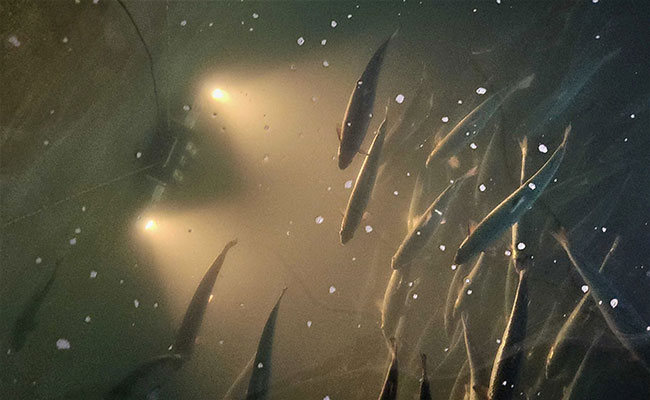
Features
Management
Technology
Power Struggle: On harnessing the power of AI
September 11, 2023 By Maddi Badiola
 ReelBiomass being tested in turbid and high-stocking conditions
Photo: ReelData AI
ReelBiomass being tested in turbid and high-stocking conditions
Photo: ReelData AI Artificial intelligence (AI) has become one of the most popular topics currently, in any industry, roundtable or forum worldwide.
Four years ago, Bill Gates went so far as to say that if he could go back in time, he would have found an AI company. The truth is, in our corner of the universe, Bill Gates had no problem becoming the richest man in the world thanks to his company, Microsoft.
Intuition, experience, and word-of-mouth advice have traditionally been a part of aquaculture development, but technological advances such as AI systems, machine learning and data analytics are becoming increasingly important to complement and replace old methodologies.
Today, aquaculture plays a key role in feeding three billion people, and, since fish have a low carbon footprint compared to other sources of animal protein, the smart and sustainable development of this industry is becoming increasingly important. In fact, I believe it is the key for the future of humanity.
The truth is that AI is a paradigm-shifting technology that will change the world. It has immense disruptive potential in all sectors and areas of our lives. Its value and benefits for the human being are unquestionable, although it also entails challenges and risks for which society and the current legal systems cannot provide an adequate response to AI must be adequately understood and managed.
In order to have a better understanding of AI and be able to write about it (admitting beforehand that I am far from being an expert), I read different magazines to learn about the different projects that are currently out there and there are a few that caught my eye:
There is a project developed by Google (called Tidal) that uses underwater camera systems and facial recognition tools to monitor fish, analyse their behaviour and detect possible diseases.
Umitron Cell is one of many smart fish feeders with the ability to manage and control 400 kg of feed remotely, which allows farmers to avoid visiting the fish cages everyday.
Another example is Atarraya Inc., a Mexican company with more than 10 years of experience helping shrimp farmers using machine learning technology and AI to predict and detect diseases, in addition to improving the quality of the microbial ecosystem and using less water, compared to traditional cultivation.
Food seems to be, in many cases, the common factor. From what I can see from these three projects, AI systems allow producers to have greater visibility and knowledge of what is happening underwater. On the other hand, machine learning for companies dedicated to cultivating salmon, shrimp, and other types of highly consumed fish, has developed solutions for their food. These systems learn the tendencies and appetites of each species and identify the best volume of food they need and at what time to supply it. Feeding optimization conserves energy in both upstream and downstream supply chain and value chain impacts.
As you have probably noticed, these mentioned projects are being implemented in offshore aquaculture. But what about RAS? Is AI not already being implemented in RAS? I reached out to Matt Zimaola, CEO and founder of ReelData AI to interview him. (Thank you!)
Before anything, I was sincere about my zero understanding about AI. He laughed, of course. He assured me that land-based aquaculture provides a superior ability to optimize every aspect of the farms and embrace circular economy principles, making it (nearly) the perfect industry/systems for its implementation.
Being aware of what is going on underwater and thus being able to tune water parameters decreases the risks, making systems and farms more efficient. The most effective feeding is done when real-time population appetite is known, adjusting feed levels accordingly to maximize biomass while limiting waste. Are my fish hungry or will they waste food and money instead? AI offers non-intrusive, autonomous, and highly accurate estimation results.
ReelData’s objective is to help industry to scale up and make farms bigger while managers can focus on other important aspects of the operations. Thus, to be a win-win trade, one of the challenges facing technology implementation within the industry is that these producers need to be guided to adopt it.
Feed, feeding behaviours, appetite… and what about energy? Can AI make any improvement? Matt said that by improving feeding regimes and strategies, energy consumption could be, with time, decreased by 20 per cent. It was then when I remembered that several months ago I had the opportunity to openly discuss with Aaron Switzer (hatchery supervisor at Michigan Department of Natural Resources) in a webinar hosted by Hatchery International energy efficiency in hatcheries.
I was happy to see that energy audits, something that I have been advocating for over 10 years, are being implemented in the industry. Nevertheless, in order to improve systems efficiency and potentially reduce energy consumption, we agreed that other actions should be taken:
- Educating people and changing operators’ mindsets about the importance of an energy-efficient system is key both from an economic and environmental point of view;
- Designers should look carefully at water, energy and oxygen when designing a system;
- That which is not measured is an unknown, so measure to make the right decisions and take action; and
- Implement good thermal insulation, LED lights, energy recovery (e.g. excess heat from the air to heat up your water), VFDs, and renewable energies.
After my interview with Matt at ReelData and being more aware about the projects and successes that AI is giving to the industry, I guess we should add another fifth point here: 5) implementation or at least trials with AI systems.
I have found that AI in aquaculture is ahead of its time, meaning it will be a while before AI reaches its potential with a meaningful, productive, and cost-effective role in the industry. Many of you know me; I am modern but skeptical and cautious about these things. As one of my business partners says, “Let’s wait and see if they are still around in two to three years.”
Technology advancements can be very rapid but not very well welcomed or at least not very well implemented in RAS. I see a difference with AI and I see it because of who is developing it. I see a real opportunity for it and I believe that energy efficiency will be benefitted from it, which makes me extremely happy! Stay tuned for the next article, this one has been too short for such a hot and trending topic.
 Maddi Badiola, PhD, PM, is a RAS engineer and co-founder of HTH Full Spectrum (fullspectrumaquaculture.com; HTHaqua.com) in Basque Country, Spain. Her expertise include energy conservation, lifecycle assessments and RAS global sustainability assessments. Email her at mbadiolamillate@gmail.com.
Maddi Badiola, PhD, PM, is a RAS engineer and co-founder of HTH Full Spectrum (fullspectrumaquaculture.com; HTHaqua.com) in Basque Country, Spain. Her expertise include energy conservation, lifecycle assessments and RAS global sustainability assessments. Email her at mbadiolamillate@gmail.com.
Print this page